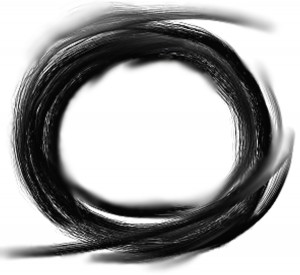And somehow, I’ve ended up with a third marketing post. But this one might be useful to a few people, so bear with me.
Wu Wei is the Chinese term for ‘effortless action’, the attainment of a purely natural way of being. It is often physically represented by a loose, graceful circle:
In the NYTimes, John Tierney writes an article about Dr. Edward Slingerland’s new ideas about a ‘paradox essential to civilization’, and the social importance of spontaneity.
The article is amazing.
Because the Times has a paywall, readers may not always be able to access it. So here’s my abstract:
Dr. Slingerland draws on thousands of years of Asian philosopy, as well as modern research in neuroscience and psychology, to show how wu wei is a foundation for human interaction at levels wider than family or clan.
The issue, Tierney says, is trust. Beyond the small kin-groups we know, the range of human interaction is fraught with the potential for deception. How to know who to trust, if you haven’t grown up with them?
“To be trusted,” he writes, “…it wasn’t enough just to be a sensible, law-abiding citizen, and it wasn’t even enough to dutifully strive to be virtuous. You had to demonstrate that your virtue was so intrinsic that it came to you effortlessly.”
Chinese texts composed three centuries BCE draw attention to the Confucian idea that merely following social rules and obligations is not enough for an aspiring politician: they must have an instinctive, effortless awareness of their duties. “If you try to be filial, this not true filiality; if you try to be obedient, this is not true obedience. You cannot try, but you also cannot not try.”
Which actually entailed a lot of background work, as Slingerland notes in his new book, Trying Not to Try: The Art and Science of Spontaneity. Confucian wu wei adherents demanded training so rigorous that the proper ‘gentleman’ would behave with graceful, apparent spontaneity under any situation. The rival school of Taoist philosophers rejected Confucian over-training for what they deemed the more-natural liberation of each person’s inherent virtues. The same argument, Dr. Slingerland notes, has been played out in Zen Buddhist, Hindu, and Christian philosophy ever since.
Wu wei shows up in modern secular life, too.
Business deals are often conducted with a bit of socially-acceptable inebriation; since alcohol inhibits self-control, it may prove that the person in front of you is exactly who they say they are. Modern sports training elevates so-called ‘muscle memory’ training to a major industry. So do public-speaking and actors’ schools. The search to ‘be cool’ drives countless teenage angst-fests, middle-life crises, and Madison Avenue ad campaigns. Marketing companies look for and prize independent bloggers and consumers who can come across as effortlessly genuine spokespeople.
Both variants of wu wei are useful to social media marketers and activists.
Over-thinking, paralysis by analysis, and over-reliance on formulaic patterns plague many new social media campaigns, until they become dull, repetitious, or – worst of all – apparently fake and duplicitious.
The trick to achieving that charismatic mix of spontaneity and experience may be what fourth century BCE Chinese scholar Mencius put forward: ‘Try, but not too hard’.
Know your business, inside and out. But when it comes to presenting yourself, make it look easy.
